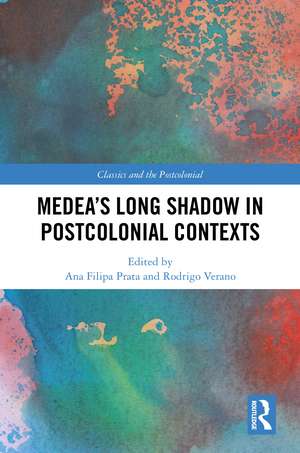Medea’s Long Shadow in Postcolonial Contexts: Classics and the Postcolonial
Editat de Ana Filipa Prata, Rodrigo Veranoen Limba Engleză Hardback – 10 iun 2024
The book considers the figure of the foreign woman, her exile, fratricide, and infanticide, in its ancient Greek form and in global, postcolonial receptions in a range of media, including drama, film, novels, and the visual arts. The chapters illuminate the contradictions of considering the classical Medea as a central reference point for analysis of other female figures from peripheral territories, while simultaneously acknowledging the insights that such comparisons can yield. Emphasizing the ways in which Medea’s seditious nature enables the establishment of an extensive and heterogeneous intertextual network with other mythic characters who represent a similarly disruptive role in their specific local historical and cultural contexts, the book argues for a comparative analysis that is equally attentive to myths and folk tales from all regions. These essays – by scholars of classics, comparative and world literatures, and postcolonial studies – represent a plurality of perspectives from different academic contexts in Africa, Latin America, North America, and Europe and examine how different cultures have depicted women, foreigners, crime, and abjection. The foundations of Greek myth and subsequently of the classical tradition itself are interrogated from a postcolonial perspective. In tracing the portrayals of Medea and other mythic women through the overlapping features of different female characters and plots, and intertwining local cultural and literary materials with broader debates, this volume challenges Eurocentric narratives of power and cultural domination, and works to decentralize the discussion of Medea from the exclusive domain of classical studies.
Medea’s Long Shadow in Postcolonial Contexts will be of interest to students and scholars working on Greek tragedy and its reception, as well as to those studying postcolonial and global approaches to literature, culture, and gender studies.
Preț: 1000.27 lei
Preț vechi: 1219.84 lei
-18% Nou
Puncte Express: 1500
Preț estimativ în valută:
191.40€ • 200.56$ • 158.23£
191.40€ • 200.56$ • 158.23£
Carte tipărită la comandă
Livrare economică 11-25 aprilie
Preluare comenzi: 021 569.72.76
Specificații
ISBN-13: 9781032261119
ISBN-10: 1032261110
Pagini: 244
Ilustrații: 4
Dimensiuni: 156 x 234 mm
Greutate: 0.45 kg
Ediția:1
Editura: Taylor & Francis
Colecția Routledge
Seria Classics and the Postcolonial
Locul publicării:Oxford, United Kingdom
ISBN-10: 1032261110
Pagini: 244
Ilustrații: 4
Dimensiuni: 156 x 234 mm
Greutate: 0.45 kg
Ediția:1
Editura: Taylor & Francis
Colecția Routledge
Seria Classics and the Postcolonial
Locul publicării:Oxford, United Kingdom
Public țintă
Postgraduate and Undergraduate AdvancedCuprins
Part 1 Reshaping Identities and Geographies 1. How Medea Challenged "Western Civilization": Europe’s Imperial Imaginary in Pasolini’s Medea 2. Archipelagic Medea: (Re)Productive Labor in Maryse Condeì, Toni Morrison and Cherriìe Moraga 3. The Medea Disorder and the Writing of the Nation in Ventos do Apocalipse by Paulina Chiziane 4. Curtailed Motherhoods and the Matrix of (Post)Colonialism: Chicana Hybrid Prototypes Part 2 Performing Transgression at the Borders 5. Medea‑Malinche, Malinche‑Medea? Identity and Transformation in Colonized Cultures 6. Medea in the Borderlands. The New Mestiza in Luis Alfaro’s Mojada 7. Rereading Medea Across Borders—Cultural Encounters and Postcolonial Rewrites in Liz Lochhead’s Medea, Yüksel Pazarkaya’s Mediha and Cherríe Moraga’s The Hungry Woman: A Mexican Medea 8. Medaaye: Patriarchy, Love and Exile in Nineteenth‑Century Yorubaland Part 3 Disseminating Reception, Reproduction and Waste 9. Hybridity and Alienation. Women’s Narrative in Ana Castillo’s So Far from God 10. Medea in the New Kingdom of Granada: Brujas, Hechiceras, Yerbateras 11. Medea in Gabon: A Postcolonial and Autobiographical Re‑telling of the Medea Myth in Bessora’s Novel Petroleum 12. "Not Before the People": Filicide, Revenge, and Ob‑scenity in Andrés Baiz’s Satanás 13. Reappropriation, Itinerancy, and Waste in Vik Muniz’s Medea
Notă biografică
Ana Filipa Prata is an Assistant Professor of Comparative Literature in the Department of Humanities and Literature at the Universidad de los Andes, Colombia. Her research focuses especially on the study of transits and migrations in contemporary Portuguese and French literature, African literatures in Portuguese language, with a specific interest in postcolonial and gender discussions and, more recently, in the debate on world literature. She is the co-editor of Cities of the Lusophone World. Literature, Culture and Urban Transformations (2018).
Rodrigo Verano is a Senior Lecturer in Classics at the Universidad Complutense de Madrid, Spain. He has worked extensively in ancient Greek linguistics, especially in the fields of Discourse and conversation analysis focusing on literary dialogues from the classical period, and in the reception of Greek and Roman literature in the contemporary world. He is the editor of A Ítaca desde el Guaviare (2019), a collection of essays that explore Homer’s poems from the Colombian post-conflict.
Rodrigo Verano is a Senior Lecturer in Classics at the Universidad Complutense de Madrid, Spain. He has worked extensively in ancient Greek linguistics, especially in the fields of Discourse and conversation analysis focusing on literary dialogues from the classical period, and in the reception of Greek and Roman literature in the contemporary world. He is the editor of A Ítaca desde el Guaviare (2019), a collection of essays that explore Homer’s poems from the Colombian post-conflict.
Descriere
This interdisciplinary volume explores the ancient Greek myth of Medea and its global analogues found in other mythic and folk tales of deadly, exiled women, such as those of La Malinche and La Llorona, examining the connections between these figures and their depictions from antiquity to modernity in a range of media.


